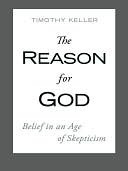More on this book
Community
Kindle Notes & Highlights
Read between
March 30 - April 22, 2020
You might say, “If I were a Christian I’d be going around pursued by guilt all the time!” But we all are being pursued by guilt because we must have an identity and there must be some standard to live up to by which we get that identity.
Whatever you base your life on—you have to live up to that. Jesus is the one Lord you can
live for who died for you—who breathed his last breath for you. Does ...
This highlight has been truncated due to consecutive passage length restrictions.
If when you have lost all fear of punishment
you also lose all incentive to live a good, unselfish life, then the only incentive you ever had to live a decent life was fear.
The founders of every other major religion essentially came as teachers, not as saviors. They came to say: “Do this and you will find the divine.” But Jesus came essentially as a savior rather than a teacher (though he was that as well). Jesus says: “I am the divine come to you, to do what you could not do for yourselves.” The Christian message is that we are saved not by our record, but by Christ’s record.
When I counsel forgiveness to people who have been harmed, they often ask about the wrongdoers, “Shouldn’t they be held accountable?” I usually respond, “Yes, but only if you forgive them.” There are many good reasons that we should want to confront wrongdoers. Wrongdoers have inflicted damage and, as in the example of the gate I presented earlier, it costs something to fix the damage. We should confront wrongdoers—to wake them up to their real character, to move them to repair their relationships, or to at least constrain them and protect others from being harmed by them in the future.
...more
Forgiveness means bearing the cost instead of making the wrongdoer do it, so you can reach out in love to seek your enemy’s renewal and change.
Why can’t we just concentrate on teaching about how God is a God of love? The answer is that if you take away the Cross you don’t have a God of love.
To bring them up emotionally you must be willing to be drained emotionally.
In The Cross of Christ, John Stott writes that substitution is at the heart of the Christian message:
The essence of sin is we human beings substituting ourselves for God, while the essence of salvation is God substituting himself for us. We…put ourselves where only God deserves to be; God…puts himself where we deserve to be.
“If Jesus rose from the dead, then you have to accept all he said; if he didn’t rise from the dead, then why worry about any of what he said? The issue on which everything hangs is not whether or not you like his teaching but whether or not he rose from the dead.”
“So what if I can’t think of an alternate explanation? The resurrection just couldn’t happen.” Let’s not forget, however, that first-century people felt exactly the same way. They found the resurrection just as inconceivable as you do. The only way anyone embraced the resurrection back then was by letting the evidence challenge and change their worldview, their view of what was possible.


